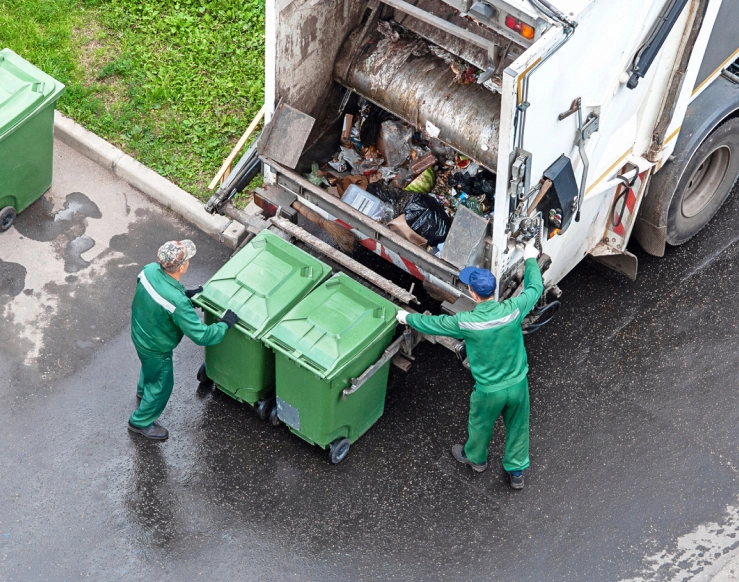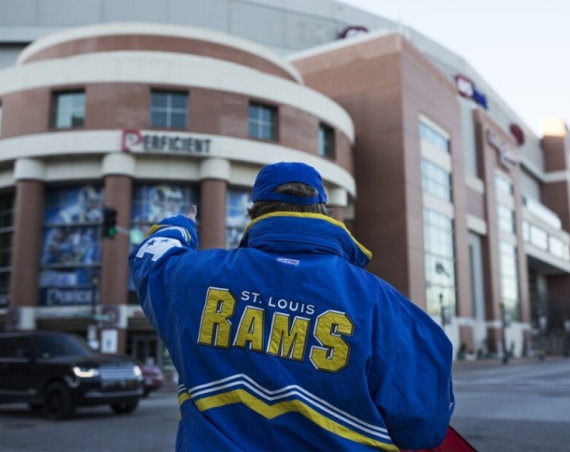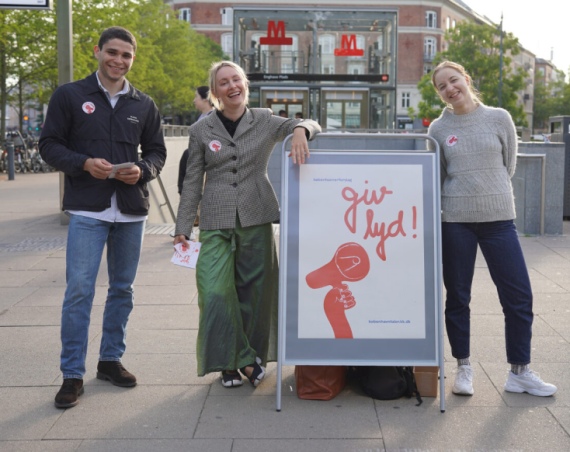Is a public consultation on a topic as sensitive as waste collections a recipe for disaster? It doesn’t have to be. Wokingham Borough Council proves that with well-designed engagement and communication strategies, you don’t need to fear getting overwhelmed by a flood of – potentially negative – reactions. Here’s how their team made a public consultation on a new waste collection strategy a success.
Wokingham Borough’s current waste and recycling collection contract expires in 2026. To ensure it continues to deliver the right service in the future, the council engaged its residents in several stages of producing their new “Waste Strategy”.

Thanks to the timeline feature on their CitizenLab platform, Wokingham Borough’s residents know at all times where in the engagement process they are, which steps the council has previously taken, and what is to come.
Aligning resident priorities with economic and environmental realities
In October 2021, Wokingham Borough started by gauging the general opinion and asked residents what matters most to them when it comes to waste and recycling collections. Over 2,000 residents responded. The majority marked reducing the amount of waste as a high priority, and 86% said they were willing to recycle more.
Increasing financial pressure, due to skyrocketing inflation and soaring energy prices, made it impossible to continue business as usual. At the same time, the council needed to nudge more residents to recycle in order to reach the 70% recycling rate it committed to in its 2030 climate emergency action plan.
Wokingham Borough Council knew that moving away from everything being collected weekly would be a tough sell. They also knew that the best way to get buy-in from the residents was to allow them to have their say in the changes.
Following extensive research, analysis and modelling, the council selected the two options that would give the best environmental and financial benefits and asked its residents in a consultation on their CitizenLab platform, Engage Wokingham Borough, how each of these would impact them, and what they thought of the options.
“We were able to reach more residents in a more cost-effective way”
Over 9,000 people responded to the online survey —more than they had anticipated! With a population of about 177,500 and 77,000 households, they were satisfied with the reach into the community: 85% of these responses came from new users.
Simon Dale, Interim Director of the Department of Place and Growth, said: “We know that 99.9% of our residents are online. By using our online engagement platform for this consultation, we knew we would be able to reach more residents in a more cost-effective way than by doing anything else.
We had paper copies available upon request and residents could also call our customer services team to take a telephone-assisted survey or stop by a library for help. 1% of the total responses used one of those methods.
Using our online engagement portal for the survey drove up registration on the platform – we knew it would as we collect waste from almost every household in the borough – which means we now have 9% of our residents signed up to engage with us.”
Large-scale communication campaign
Focus on representativeness
One of the biggest drivers for the success of this consultation was Wokingham Borough’s communication strategy to promote the waste collection survey. It was designed to ensure they heard from as many different communities as possible.
They used a variety of communications channels to reach a wide audience, including their regular channels, such as social media and email newsletters, and a borough-wide direct mailing of postcards with details for households on how to take part.
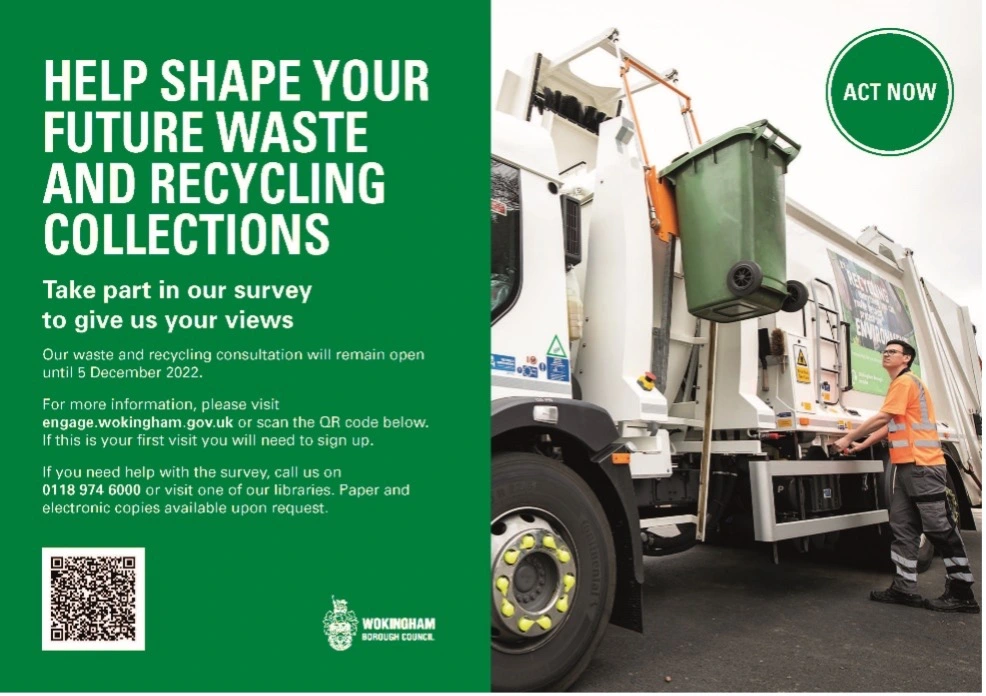
The council’s communications and engagement team was keen to ensure diversity, so mid-way through the survey they looked at who had taken part and identified a couple of groups who were under-represented, specifically residents under 35 years old, men, and those with an Asian background. That’s why the engagement team also made sure to reach individuals from communities who, they know from experience, may not have otherwise participated in the survey. They did so by:
- Using targeted social media ads
- Contacting community and faith groups to extend the reach of the consultation.
Detailed preparation for negative reactions
The council was well prepared for negative feedback and comments during the public consultation, thanks to detailed FAQs the team created upfront. The FAQs covered a range of potential concerns and questions that residents might have, so the communications, customer services, and libraries teams had answers quickly available. This way, the council was able to address concerns quickly and demonstrate its commitment to transparency and open communication. This approach helped build trust with residents and minimise confusion or misinformation.
Overall, the response to the survey was positive, and the council got support from a large part of its residents.
Information clearly conveyed thanks to the CitizenLab platform possibilities
We particularly liked this consultation’s levels and methods of information-sharing. For instance, Wokingham Borough Council’s engagement team made very good use of the configurability of their platform’s project pages to present information.
Before diving into the survey, residents could, for example, read more about why changes were necessary, and how the financial, legislative, and environmental realities impacted the ways forward. This meant that they could then participate in a fully informed way.
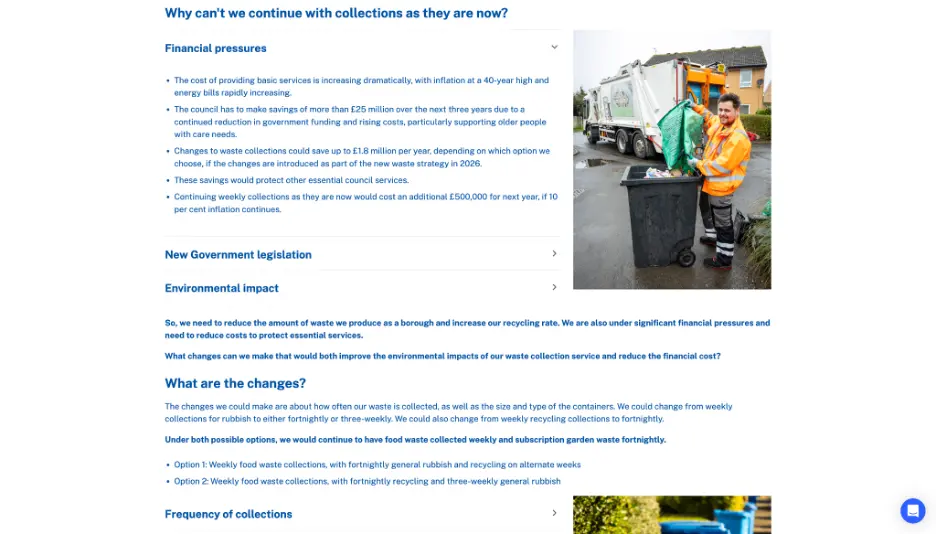
Example of how Wokingham Borough’s communications and engagement team presented information. The team made good use of the available dropdown and accordion features in the platform’s Content Builder to add detailed information without overwhelming visitors.
“Clear, understandable information was key to this survey being a success. We took the time to get it right, as we know waste is always a sensitive topic and there would be a lot of interest in it. Our engagement platform allowed us to display the information in an engaging way that wasn’t too much for residents to take in.”
Simon Dale, Interim Director of the Department of Place and Growth at Wokingham Borough
“In the information presented, Wokingham’s engagement team clearly referenced the previous survey outcomes and linked these to the proposed solutions in the information presented. This helps residents recognise their voice is heard and builds support for suggested changes, even though they might be less favourable than the current situation.”
Rabi Wilson, Government Success Manager UK
What’s next?
The Wokingham Borough team closed this very successful consultation in mid-December 2022 and dove right into the analysis. The results were shared with all participants and the general public in March 2023 on the platform, on the council’s website, and during an in-person public meeting.
Good preparation leads to better engagement projects
The case of Wokingham Borough and their use of CitizenLab’s platform demonstrates that with good preparation, a solid communications strategy, and a comprehensive tool, local governments can consult their residents on any topic – even very divisive ones – without fearing backlash.
As local governments continue to face complex challenges and invite diverse opinions, CitizenLab’s platform offers a valuable tool for fostering transparent and effective community engagement.
Want to find out how our digital engagement platform can help you create more inclusive and continuous engagement? Let’s chat!
[This case study was last updated in March 2023]
